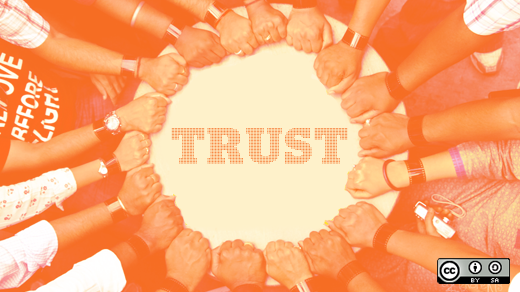Time and again, The Open Organization (and all of the community-driven materials surrounding it) highlights the importance of driving organizational change through collaboration and inclusive decision-making.
But driving change in a meritocracy isn't as easy as saying, "I'm going to be more collaborative." Collaboration is a spirit, an attitude, something that should be a part of every practice in an open organization. It just doesn't work unless everyone from the CEO to the newest hire is willing to set aside ego for the sake of a shared goal.
I had an opportunity to learn this early in my career. Unfortunately, I nearly ruined a professional relationship in the process.
Years ago, I was working as an editor and convinced that I was quite good at my job. I was busy hacking away at something when a manager asked if she could call to brainstorm some ideas with me. Feeling obligated to bend to the request of someone who outranked me, I agreed, but I really just wanted her to email me to tell me what she wanted so I could do it and get on with the rest of the things on my list.
That desire to have her adjust to my communication style instantly became resentment that she would dare to waste my time with brainstorming. Ugh!
And that is how quickly one little thought can spin out of control. The result is that when she called to ask my professional opinion on customer-facing material, just about the only things I said were, "Mmmhmm ... sure ... I don't know ... yeah, can you just email it to me?" all through gritted teeth.
We clearly had different objectives for that conversation, although I didn't recognize it at the time. She had come to me in the spirit of collaboration, seeking the best solution for our customers and trusting me as an expert in the field. I, however, was focused on my ego. And that interaction colored our relationship until just recently—about four years after the event—when I finally realized what had happened and reached out to her to apologize.
Looking back, I can see that even the best leadership training in the world wouldn't have helped to prevent that situation. She was doing exactly what we'd recommend she do: collaborate, trust others, let the best ideas win. However, if I'd understood the importance of working toward a shared goal, that would have made all the difference.
Email lists and IRC can create a certain illusion of anonymity, much like the comments section below. That plays into the assumption that participating in a meritocracy means you can say whatever you want, whenever you want, to whomever you want, and the best idea will prevail. Sometimes I see emails on mailing lists from people who make me wonder if they realize there's a human being on the other side. But what does being rude really accomplish?
It all goes back to working toward a shared goal. Imagine a leader in your open organization makes a decision you don't agree with. The leader's goal is not to ruin your life, but to make the best decision possible given all of the existing constraints. Your goal is not to insult that leader, but to help make sure she has all of the context required to understand the full ramifications of her decision. Being rude accomplishes nothing. Working toward the shared goal of the best decision for everyone involved is everything. What do you think would have happened if I had stopped myself and identified the shared goal before I picked up that phone?
I wouldn't have lost anything. Instead, I would have built a relationship of trust with someone that would have benefited me in the future, and I wouldn't have experienced any anxiety or frustration.
Ultimately, the product we delivered to our customers would have been far better. And that's all that really matters.






4 Comments